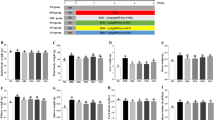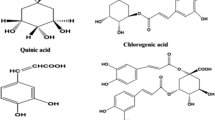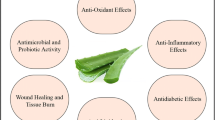Abstract
The effects of Jerusalem artichoke (JA) on hypoglycemia and hepatoprotection in streptozotocin (STZ)-induced diabetic rats were investigated. Water extract of Jerusalem artichoke (JAE) reversed the increase in serum glucose levels in STZ-induced diabetic rats. Further, JAE treatment remarkably prevented elevation of serum aspartate aminotransferase, alanine aminotransferase, lactate dehydrogenase, and γ-glutamyl transpeptidase levels in STZ-induced diabetic rats. Treatment with JAE also improved lipid profiles damaged by STZ in the liver by reducing serum levels of triglycerides and total cholesterol. These results suggest that oral administration of JAE may have a potential benefit of ameliorating diabetic symptoms by improving liver damage caused by STZ. This study gives useful information for understanding the anti-diabetic effect of JA.
Similar content being viewed by others
References
Daisy P, Jasmine R, Ignacimuthu S, Murugan E. A novel steroid from Elephantopus scaber L. an ethnomedicinal plant with antidiabetic actvity. Phytomedicine 16: 252–257 (2009)
Baynes JW, Thorpe SR. Role of oxidative stress in diabetic complications: A new perspective on an old paradigm. Diabetes 48: 1–9 (1999)
Videla LA. Oxidative stress signaling underlying liver disease and hepatoprotective mechanisms. World J. Hepatol. 31: 72–78 (2009)
Ahmed RG. The physiological and biochemical effects of diabetes on the balance between oxidative stress and antioxidant defense system. Med. J. Islamic World Acad. Sci. 15: 31–42 (2005)
Mohora M, Greabu M, Muscurel C, Duta C, Totan A. The sources and the targets of oxidative stress in the etiology of diabetic complications. Rom. J. Biophys. 17: 63–84 (2007)
Litzenberger SC. Guide for Field Crops in the Tropics and Subtropics. Agency for International Development, Washington, DC, USA. pp. 242–250 (1974)
Waters L, Davis D, Riehle L, Weins M. Jerusalem Artichokes Trials. Department of Horticulture, University of Minnesota, St. Paul, MN, USA. pp. 1–2 (1981)
Park BS. Effect of oral administration of Jerusalem artichoke inulin on reducing blood lipid and glucose in STZ-induced diabetic rats. J. Anim. Vet. Adv. 10: 2501–2507 (2011)
Yang HJ, Kwon DY, Kim MJ, Kang S, Kim DS, Park S. Jerusalem artichoke and cheonggukjang additively improve insulin secretion and sensitivity in diabetic rats. Nutr. Metab. 9: 112–124 (2012)
Jia DM, Tabaru A, Akiyama T, Abe S, Otsuki M. Fatty liver, chronic viral hepatities, and autoimmune hepatities. Troglitazone prevents fatty changes of the liver in obese diabetic rats. J. Gastoen. Hepatol. 15: 1183–1191 (2000)
Schnedl WJ, Wallner SJ, Piswanger C, Krause R, Lipp RW. Glycated hemoglobin and liver disease in diabetes mellitus. Wien. Med. Wochenschr. 155: 411–415 (2005)
Kim D, Fan JP, Chung HC, Han GD. Changes in extractability and antioxidant activity of Jerusalem artichoke (Helianthus tuberosus L.) tubers by various high hydrostatic pressure treatments. Food Sci. Biotechnol. 19: 1365–1371 (2010)
Xie JT, Wang A, Mehendale S, Wu J, Aung HH, Dey L, Qiu S, Yuan CS. Anti-diabetic effects of Gymnema yunnanense extract. Pharmacol. Res. 47: 323–329 (2003)
Elizabeth H, Harris MD. Elevated liver function tests in type 2 diabetes. Clin. Diabetes 23: 115–119 (2005)
Schmatz R, Perreira LB, Stefanello N, Mazzanti C, Spanevello R, Gutierres J, Bagatini M, Martins CC, Abdalla FH, Daci da Silva Serres J, Zanini D, Vieira JM, Cardoso AM, Schetinger MR, Morsch VM. Effects of resveratrol on biomarkers of oxidative stress and on the activity of delta aminolevulinic acid dehydratase in liver and kidney of streptozotocin induced diabetic rats. Biochimie 94: 374–383 (2012)
Moreno-Otero R, Trapero-Marugán M. Hepatoprotective effects of antioxidants in chronic hepatitis C. World J. Gastroentero. 21: 1937–1938 (2010)
Maling HM, Frank A, Horning MG. Effect of carbon tetrachloride on hepatic synthesis and release of triglycerides. Biochim. Biophys. Acta 64: 540–545 (1962)
Hwang HJ, Kim SW, Lim JM, Joo JH, Kim HO, Kim HM, Yun JW. Hypoglycemic effect of crude exopolysaccharides produced by a medicinal mushroom Phellinus baumii in streptozotocin-induced diabetic rats. Life Sci. 76: 3069–3080 (2005)
Bayramoglu A, Bayramoglu G, Senturk H. Lycopene partially reverses symptoms of diabetes in rats with streptozotocin-induced diabetes. J. Med. Food 16: 1–5 (2013)
Author information
Authors and Affiliations
Corresponding author
Rights and permissions
About this article
Cite this article
Kim, HS., Han, G.D. Hypoglycemic and hepatoprotective effects of Jerusalem artichoke extracts on streptozotocin-induced diabetic rats. Food Sci Biotechnol 22, 1121–1124 (2013). https://doi.org/10.1007/s10068-013-0192-8
Received:
Revised:
Accepted:
Published:
Issue Date:
DOI: https://doi.org/10.1007/s10068-013-0192-8




